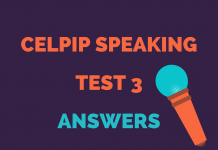The CELPIP (Canadian English Language Proficiency Index Program) test assesses your proficiency in English, specifically for those who want to study or work in Canada. One section of the test is the listening component, which tests your ability to understand spoken English in various contexts. To perform well in the listening section, you need to know how to answer CELPIP listening questions effectively.
Here are some key strategies and tips that you can use to help you excel in the CELPIP listening component:
Familiarize Yourself with the Format of the Test
Before you take the CELPIP test, it’s important to familiarize yourself with the format of the test. You should know how many sections are there in the listening component, the number of questions in each section, and the types of questions you will be asked. By knowing the format of the test, you can better prepare yourself for the types of questions you will encounter and ensure that you are using your time efficiently.
Practice Active Listening
Active listening is a technique that requires you to fully concentrate on what the speaker is saying. In other words, you need to pay attention to the speaker’s tone of voice, intonation, and body language to understand the message effectively. During the test, listen to the speaker carefully, and avoid getting distracted by your surroundings. Take notes to help you remember important details and focus on the speaker’s message.
Improve Your Vocabulary
To understand spoken English, you need to have a good understanding of English vocabulary. You can improve your vocabulary by reading English books, watching English movies, and listening to English podcasts. Additionally, you can create flashcards to memorize new words and their meanings.
Predict the Answer
One of the most effective strategies for answering CELPIP listening questions is to predict the answer before listening to the speaker. Read the question carefully and try to anticipate what the speaker will say. By doing this, you can listen more effectively and identify the correct answer quickly.
Listen for Keywords
When listening to the speaker, pay attention to keywords. Keywords are the most critical words that give meaning to the message. For example, if the speaker says “I’m sorry, but the class is canceled,” the keyword is “canceled.” By focusing on the keywords, you can understand the message more accurately and answer the question correctly.
Eliminate Wrong Answers
If you are not sure about the answer, try to eliminate the wrong choices. You can do this by using the process of elimination. For example, if the speaker talks about the advantages and disadvantages of two products, and the question asks you to choose the better one, eliminate the one with more disadvantages. This strategy can help you narrow down your choices and increase your chances of getting the correct answer.
Keep Track of Time
In the CELPIP listening component, you have a limited amount of time to answer the questions. Make sure that you keep track of the time and answer the questions as quickly and accurately as possible. If you get stuck on a question, move on to the next one and come back to it later if you have time.
In conclusion, the CELPIP listening component is an essential part of the test, and it requires you to have excellent listening skills to perform well. By following the tips and strategies outlined above, you can improve your chances of success and confidently answer the questions in the listening component. Remember to practice active listening, familiarize yourself with the test format, and focus on the keywords to understand the message accurately. Good luck with your CELPIP test!









